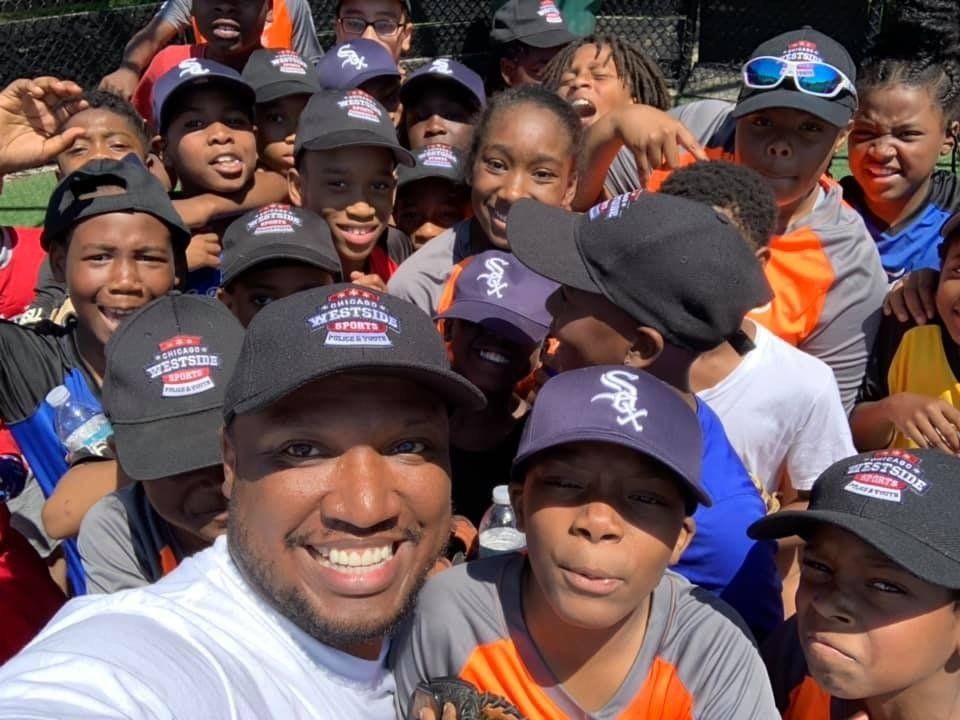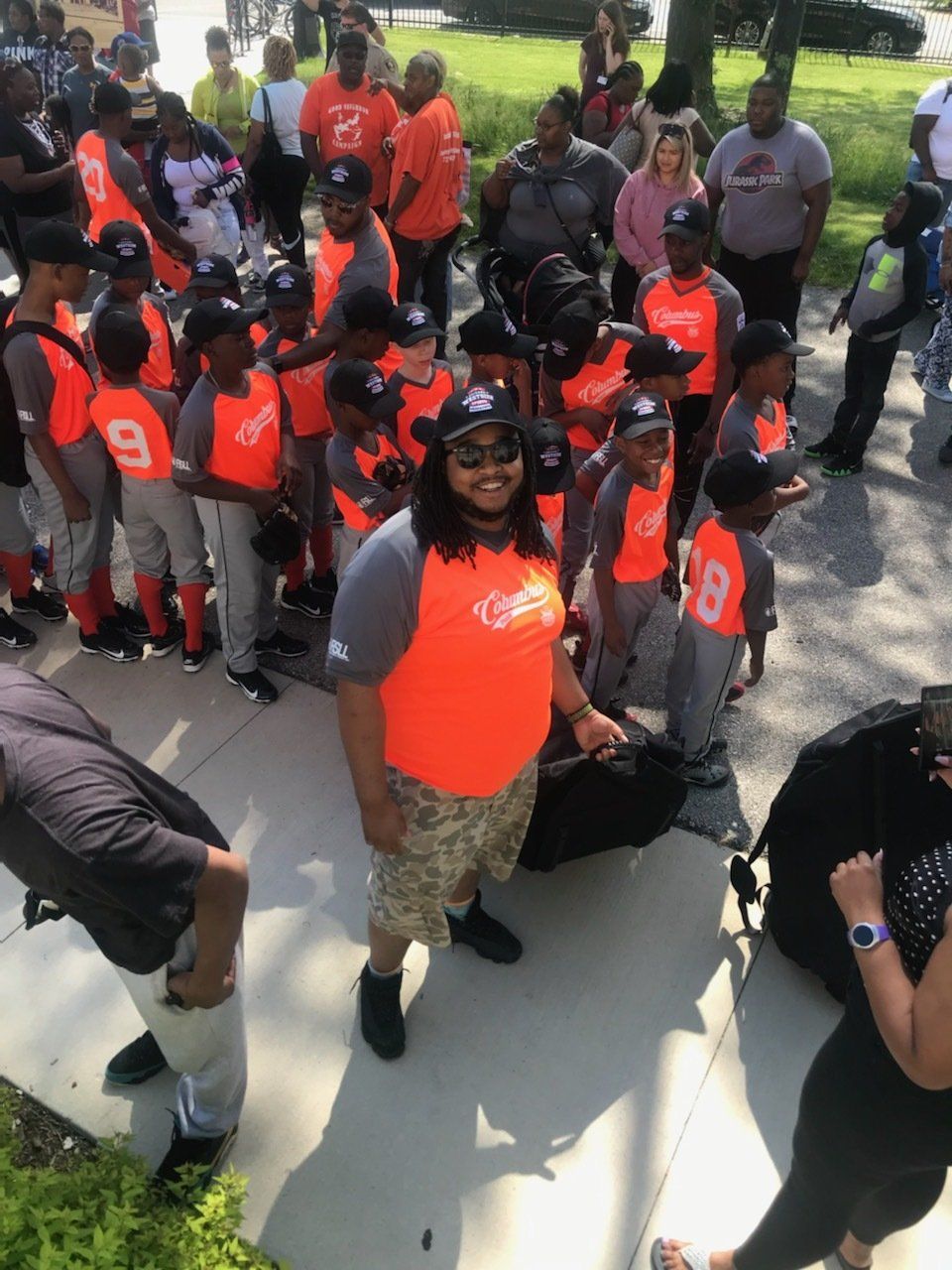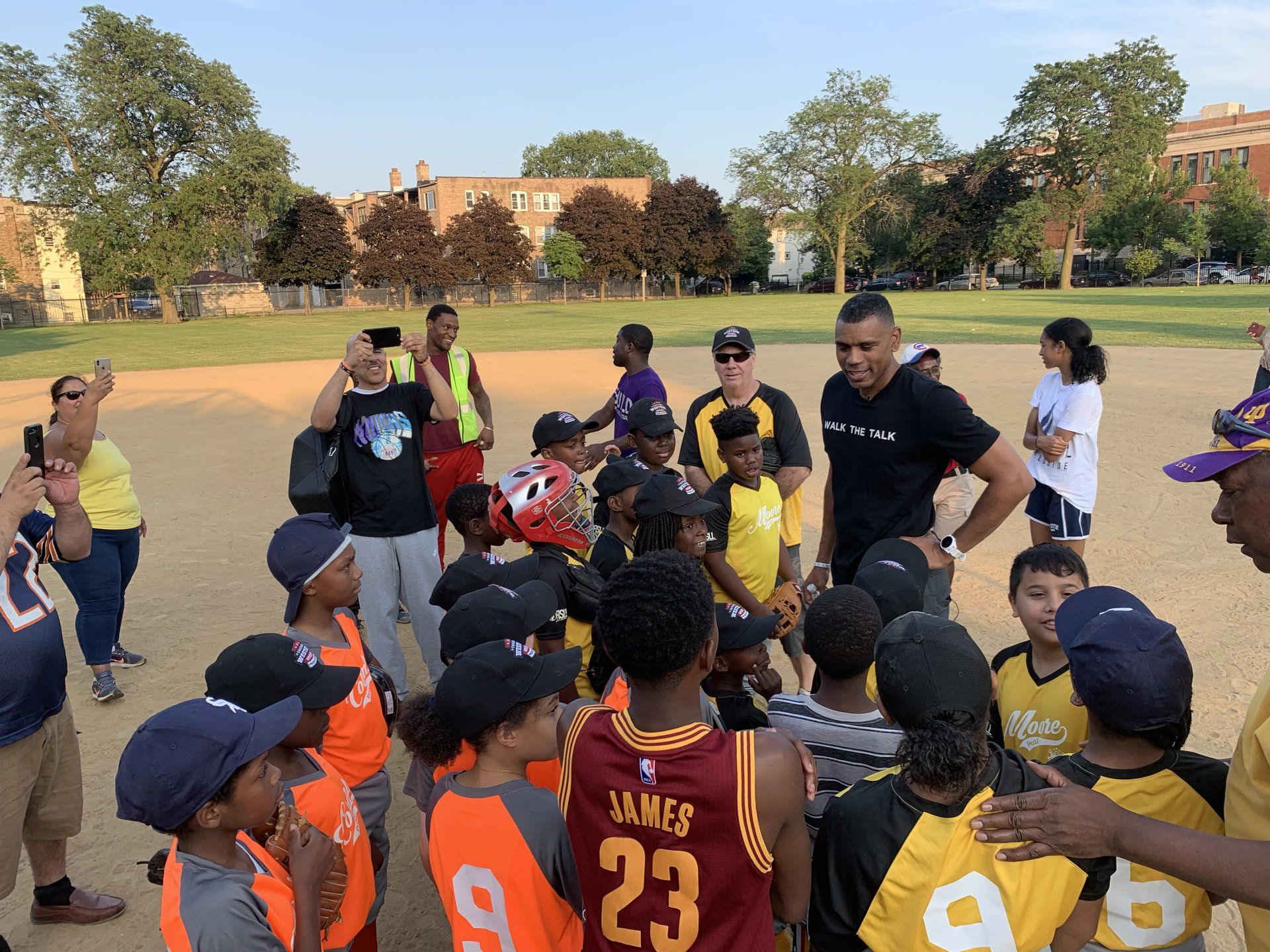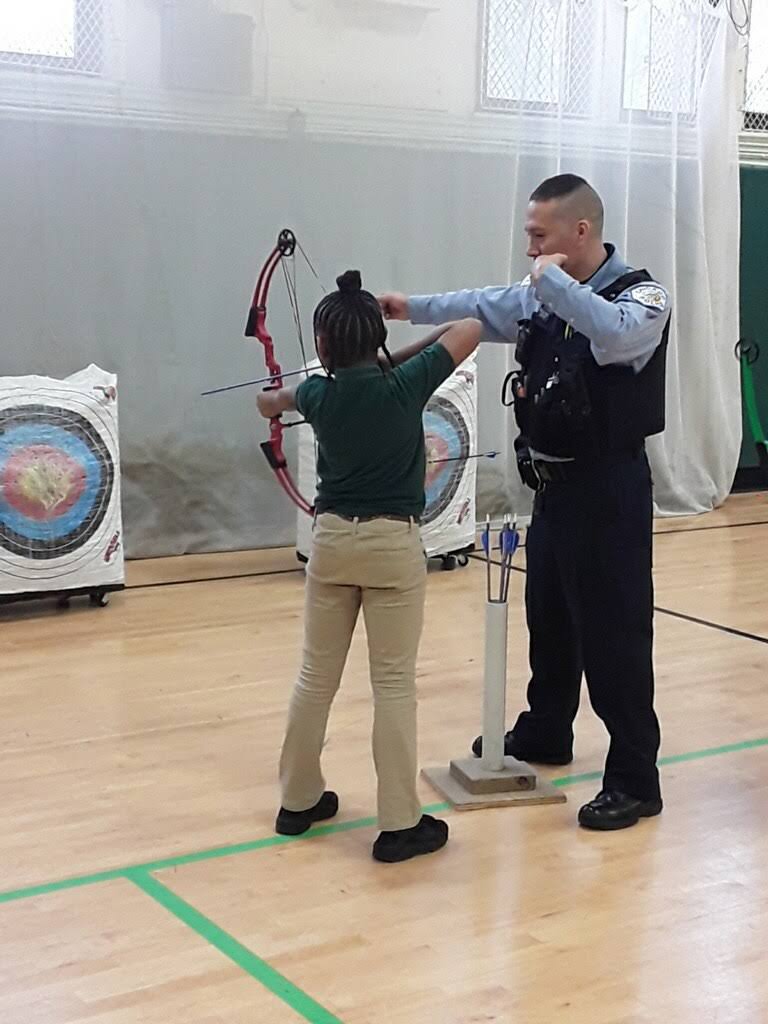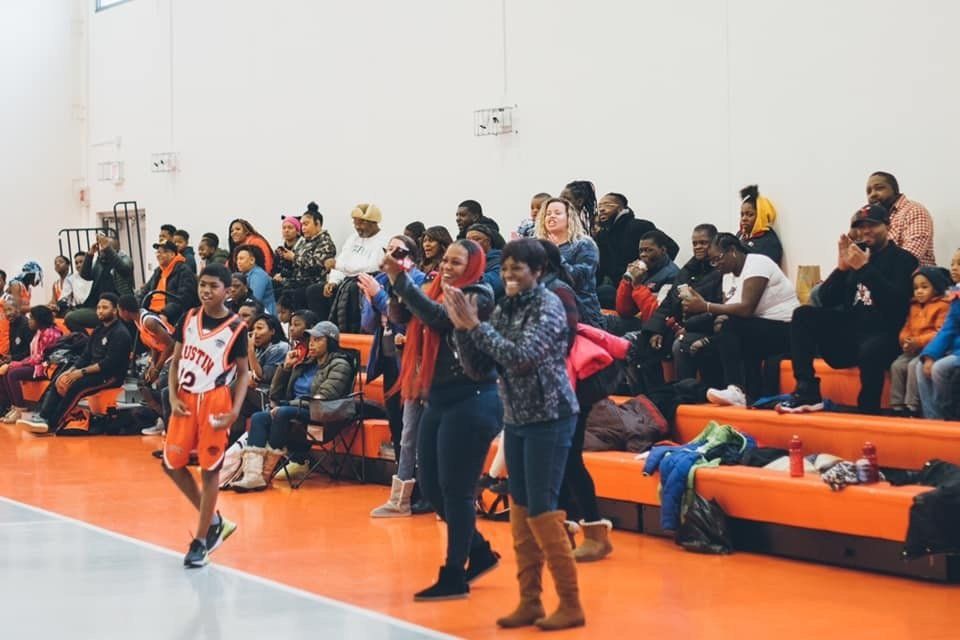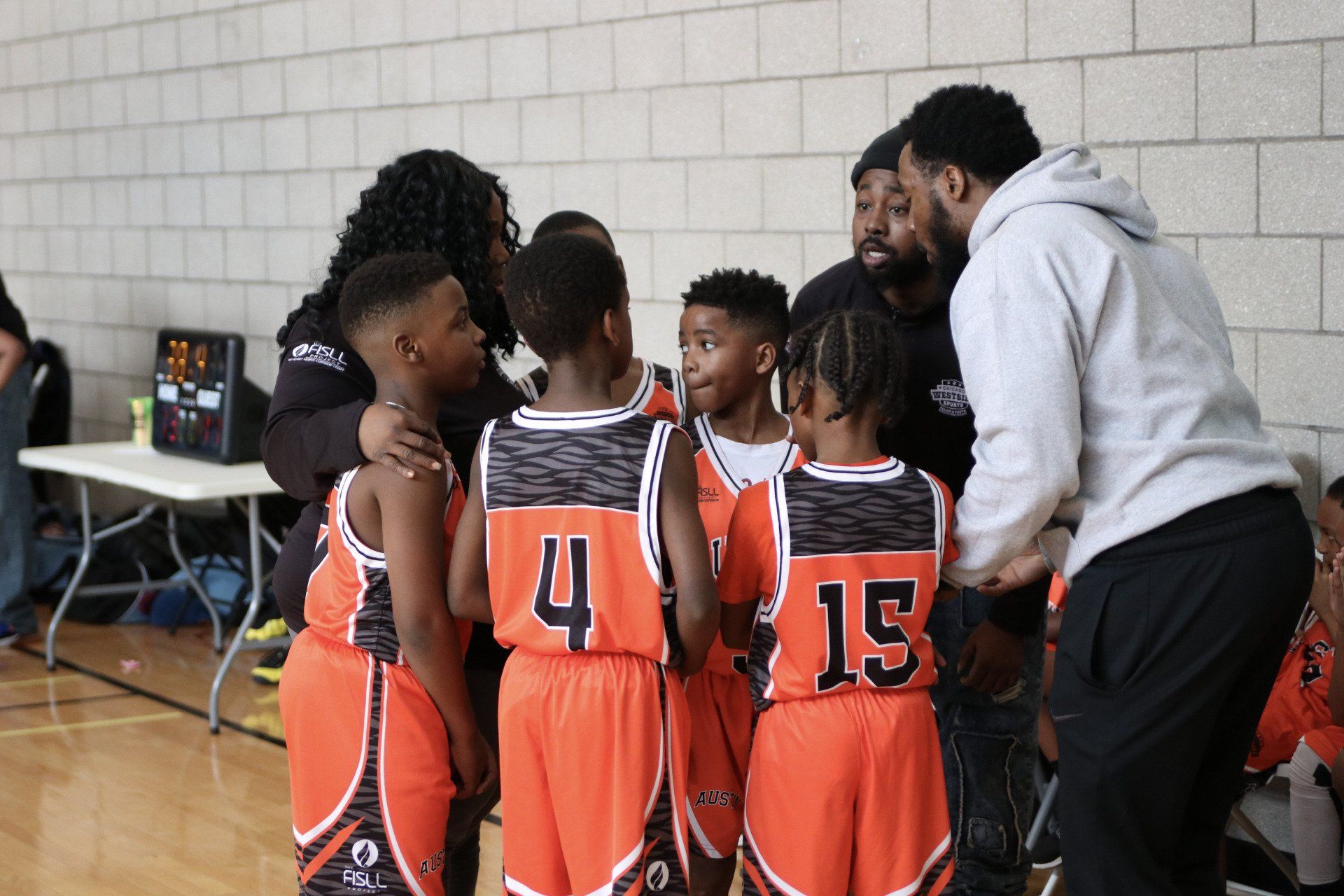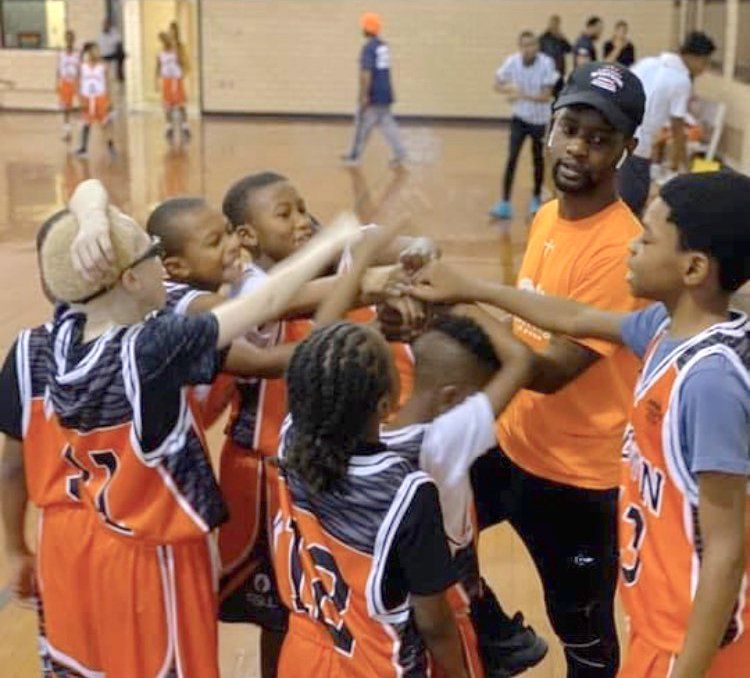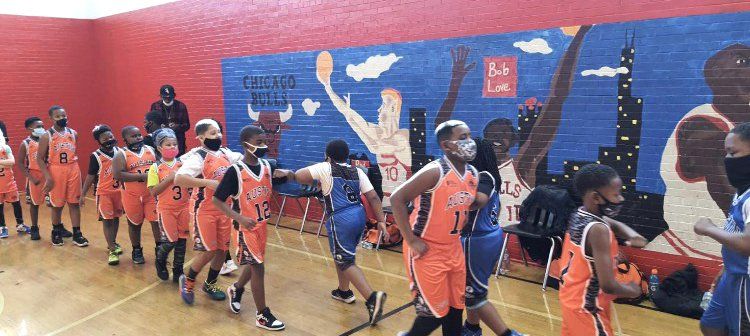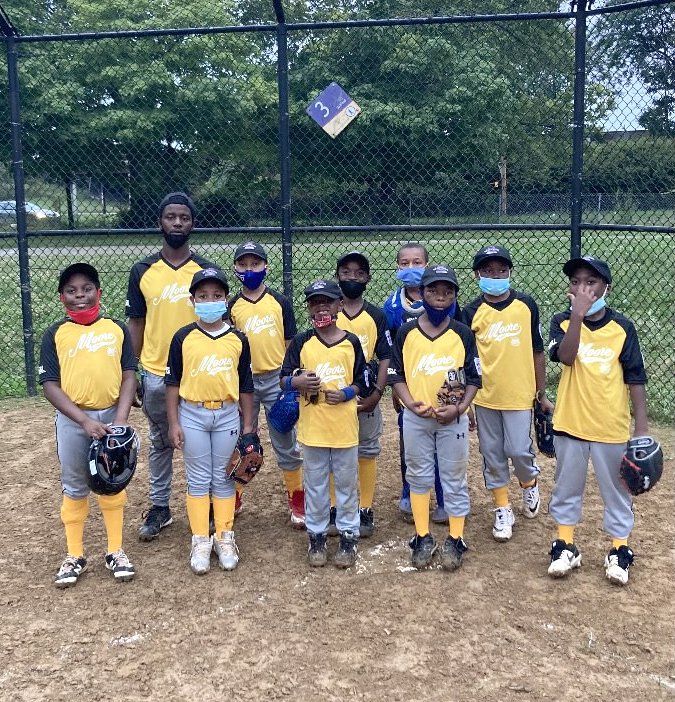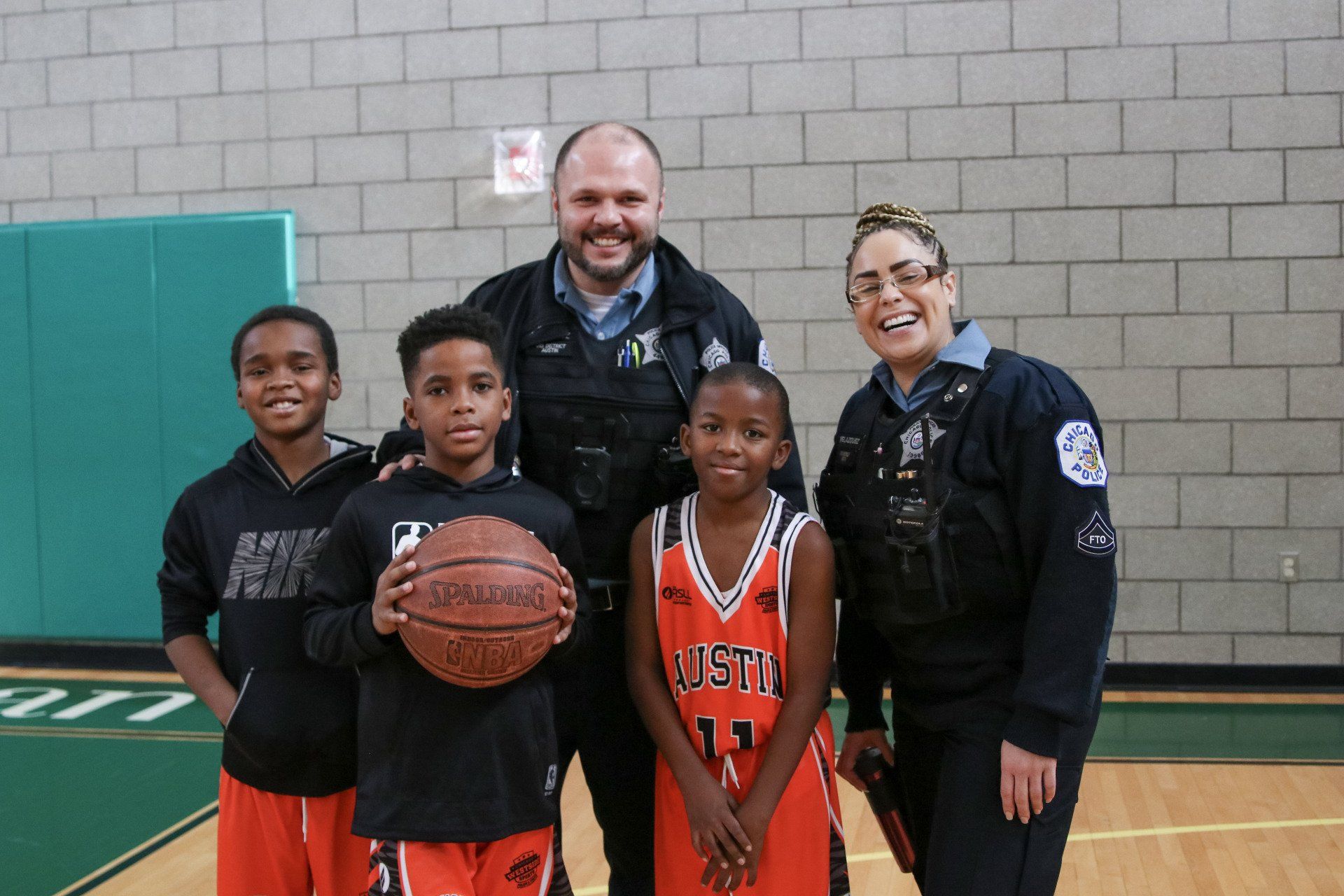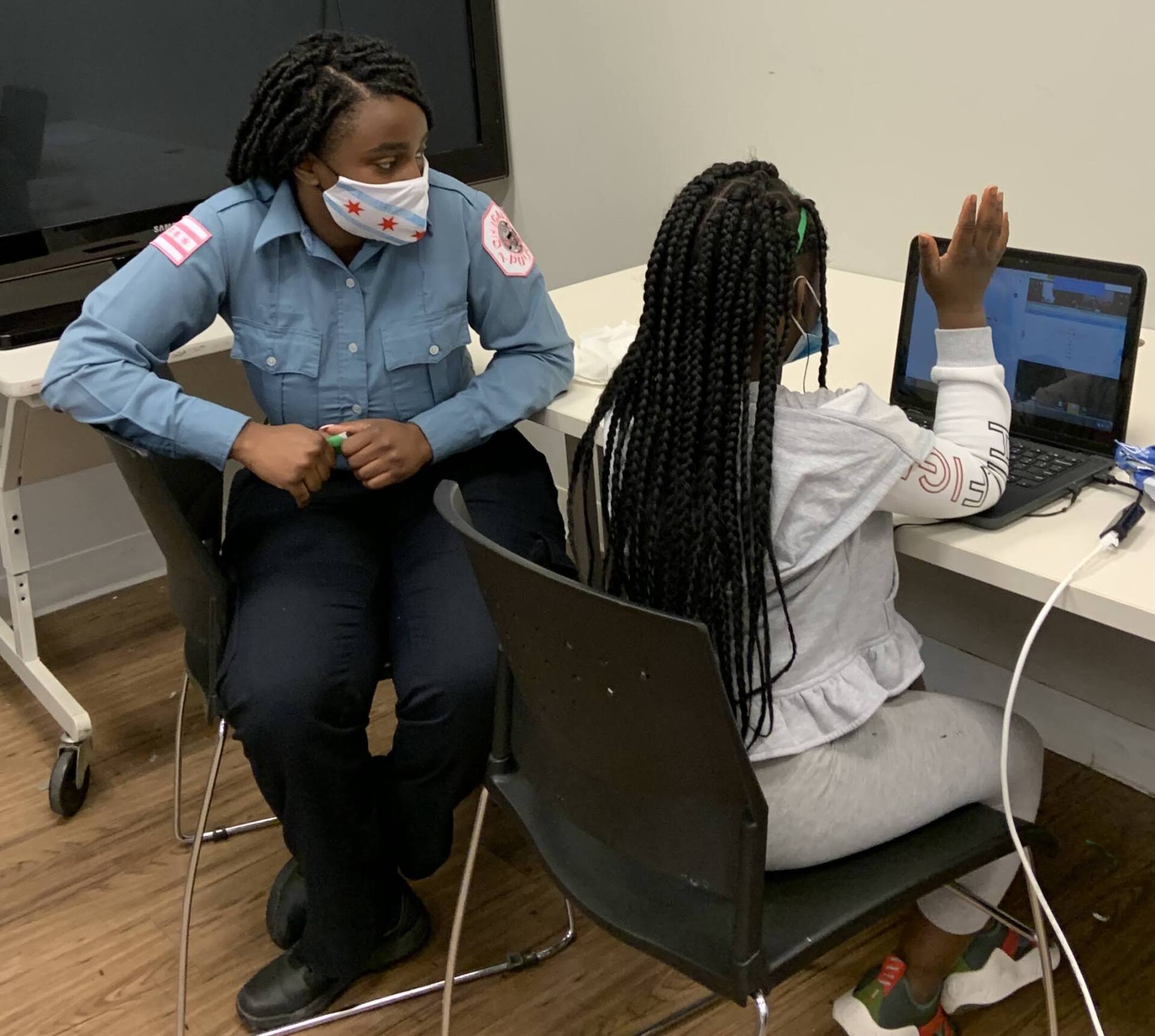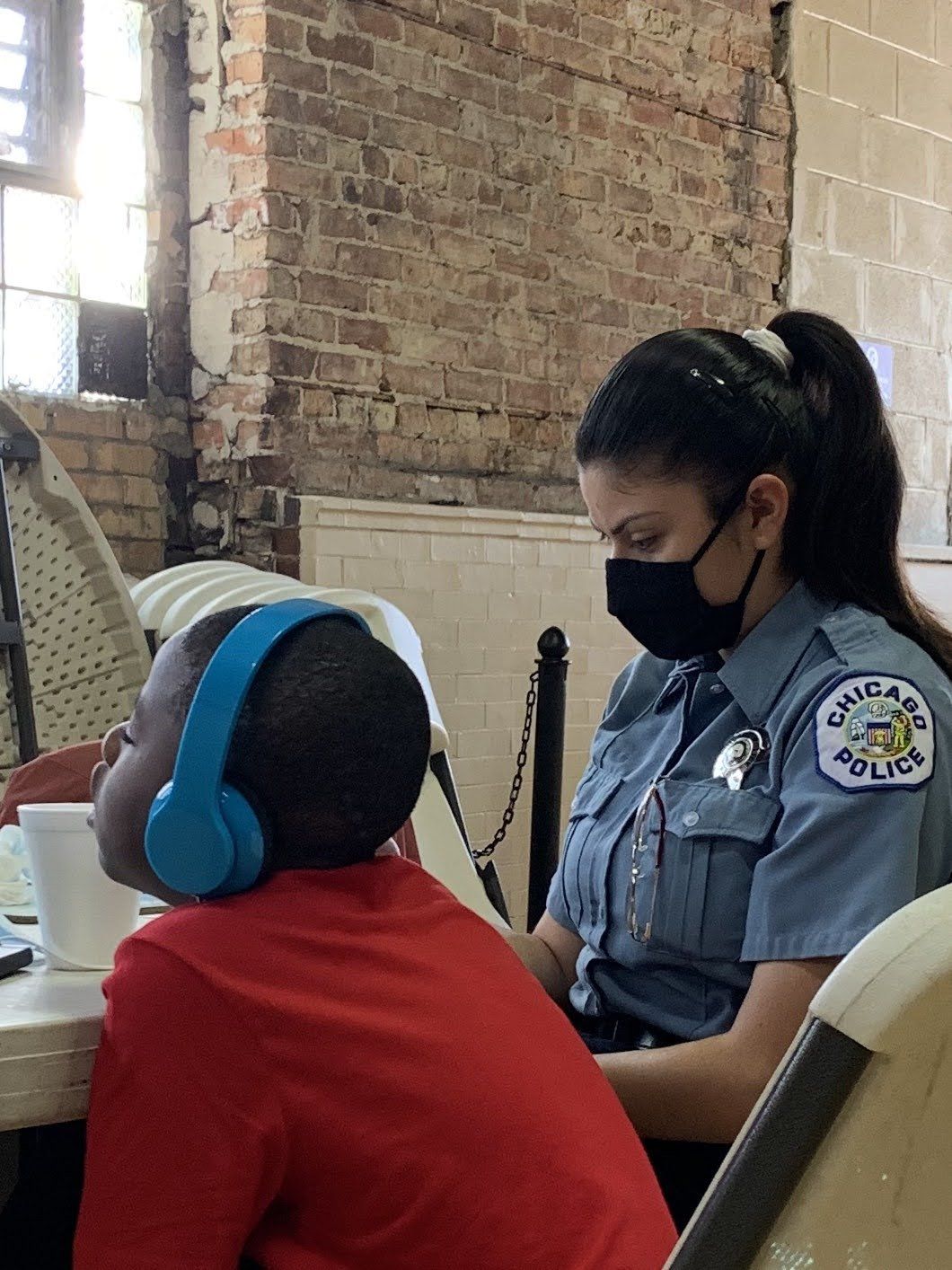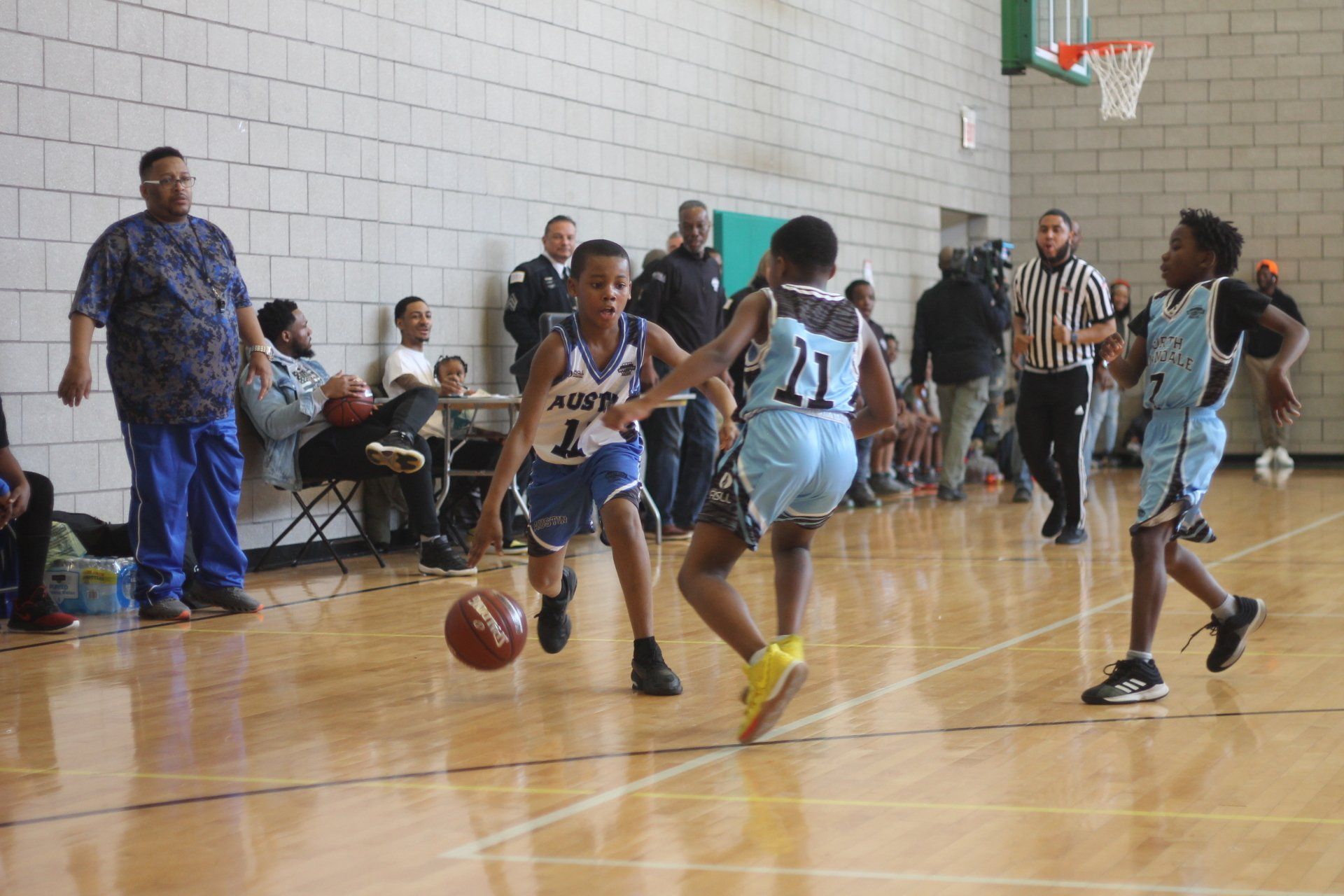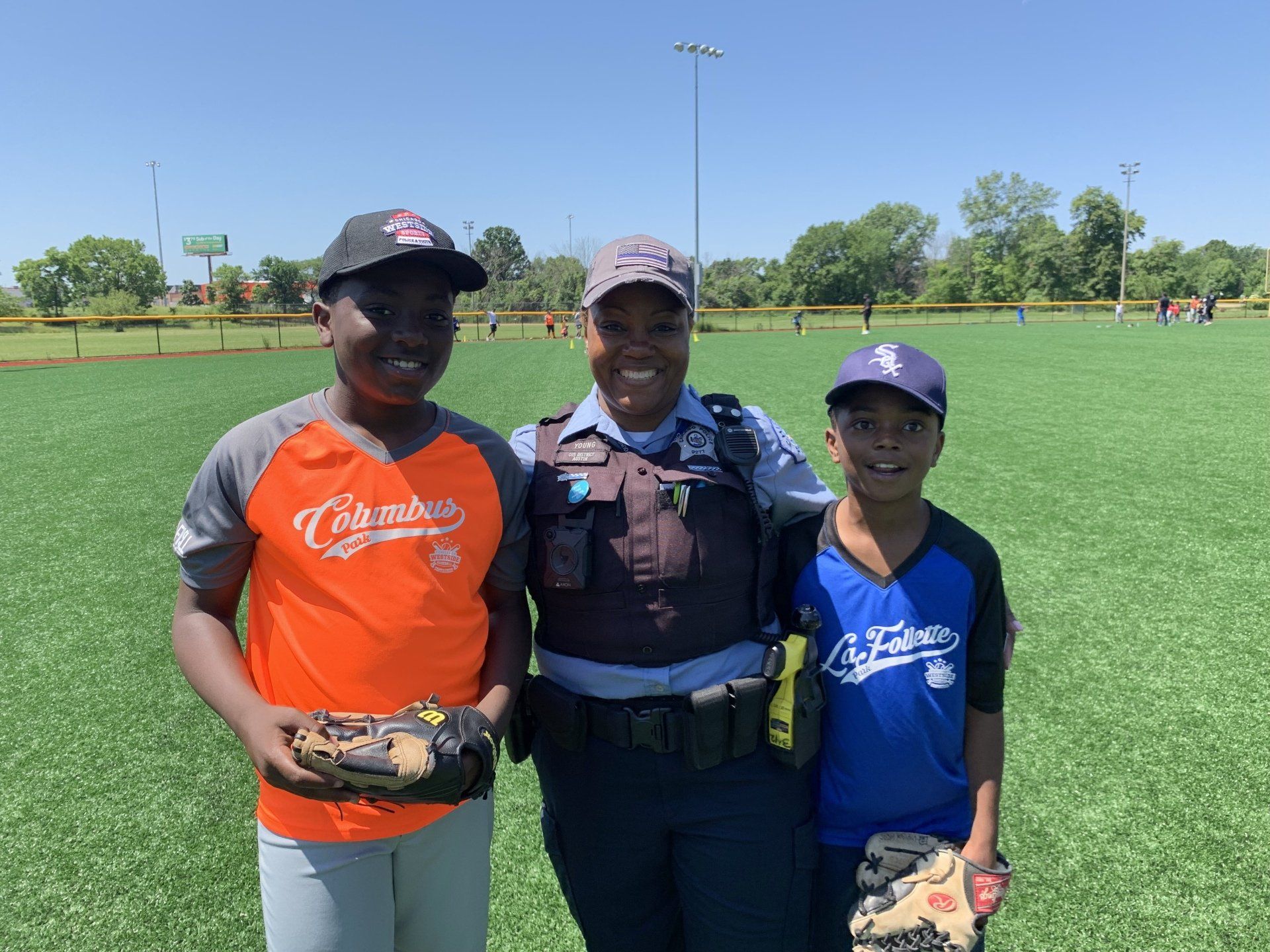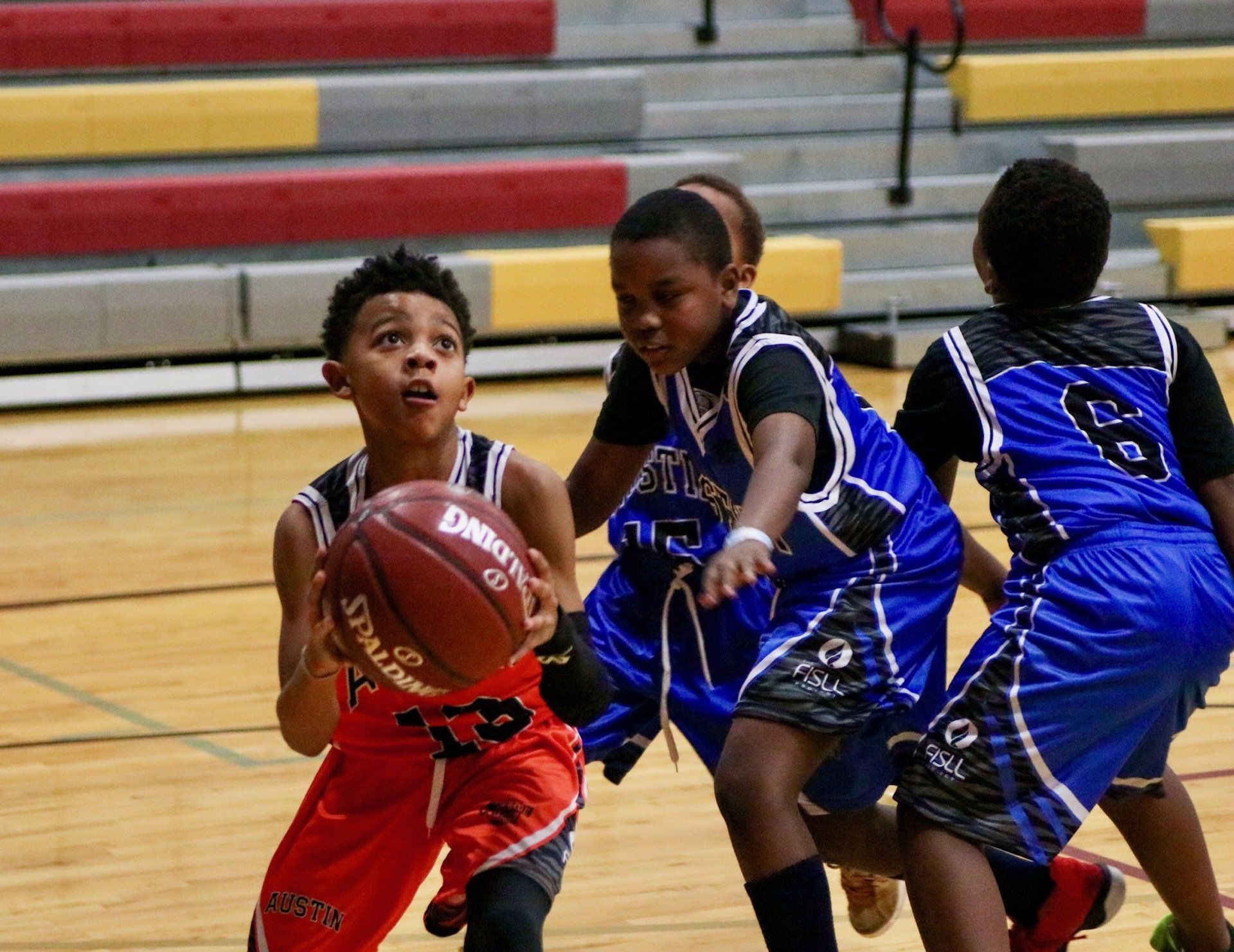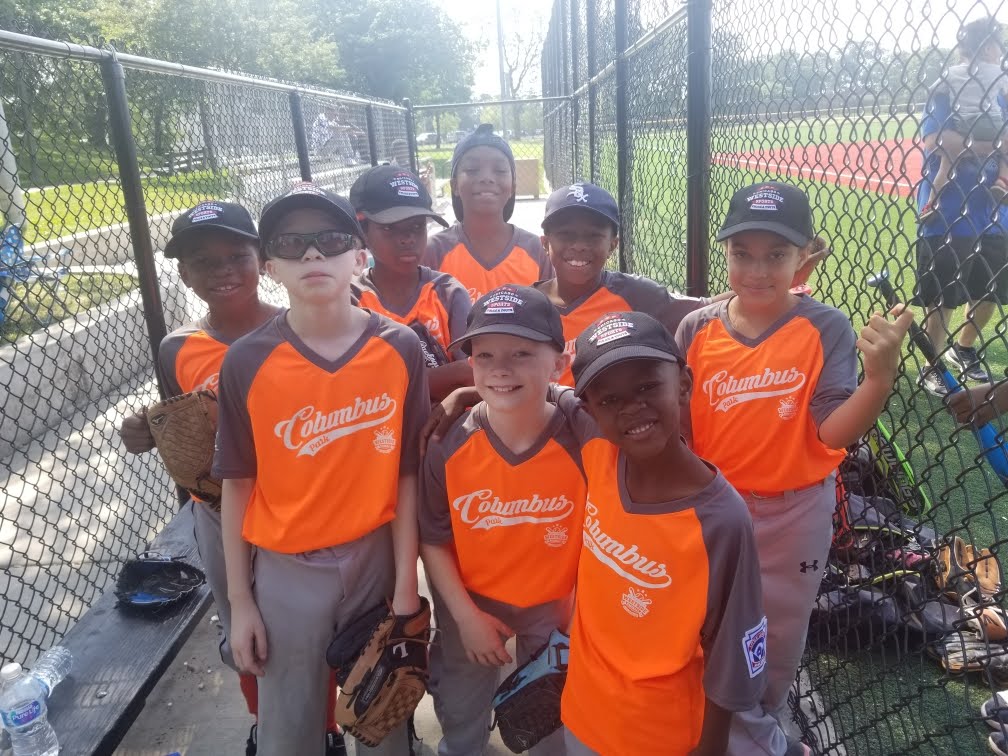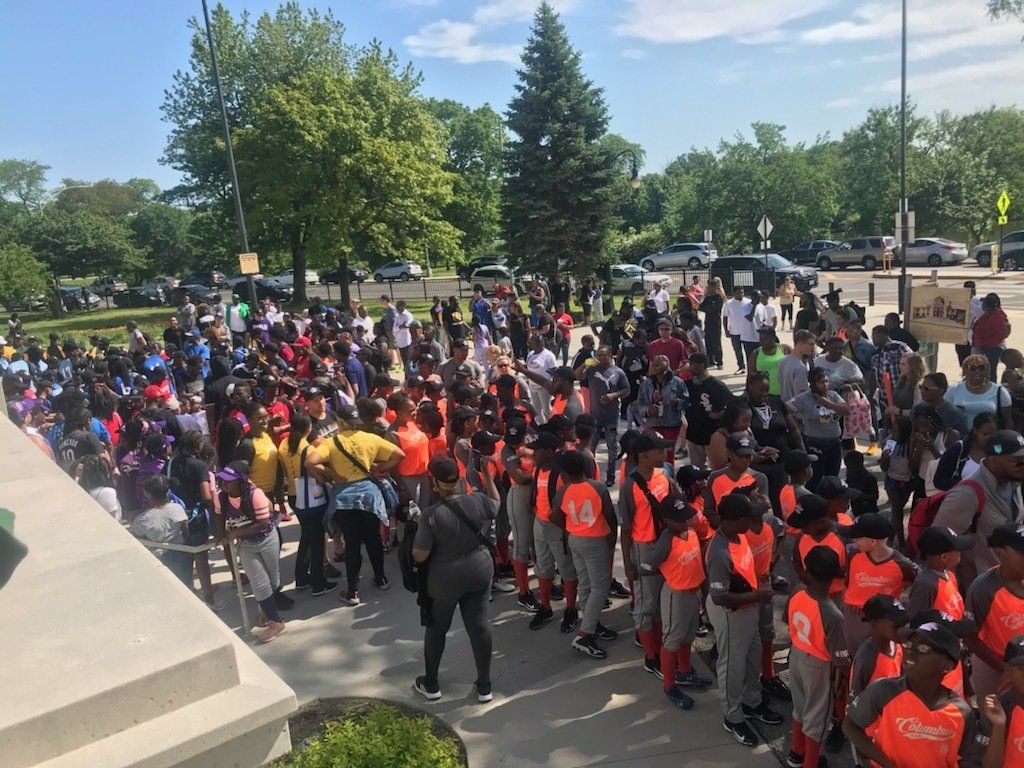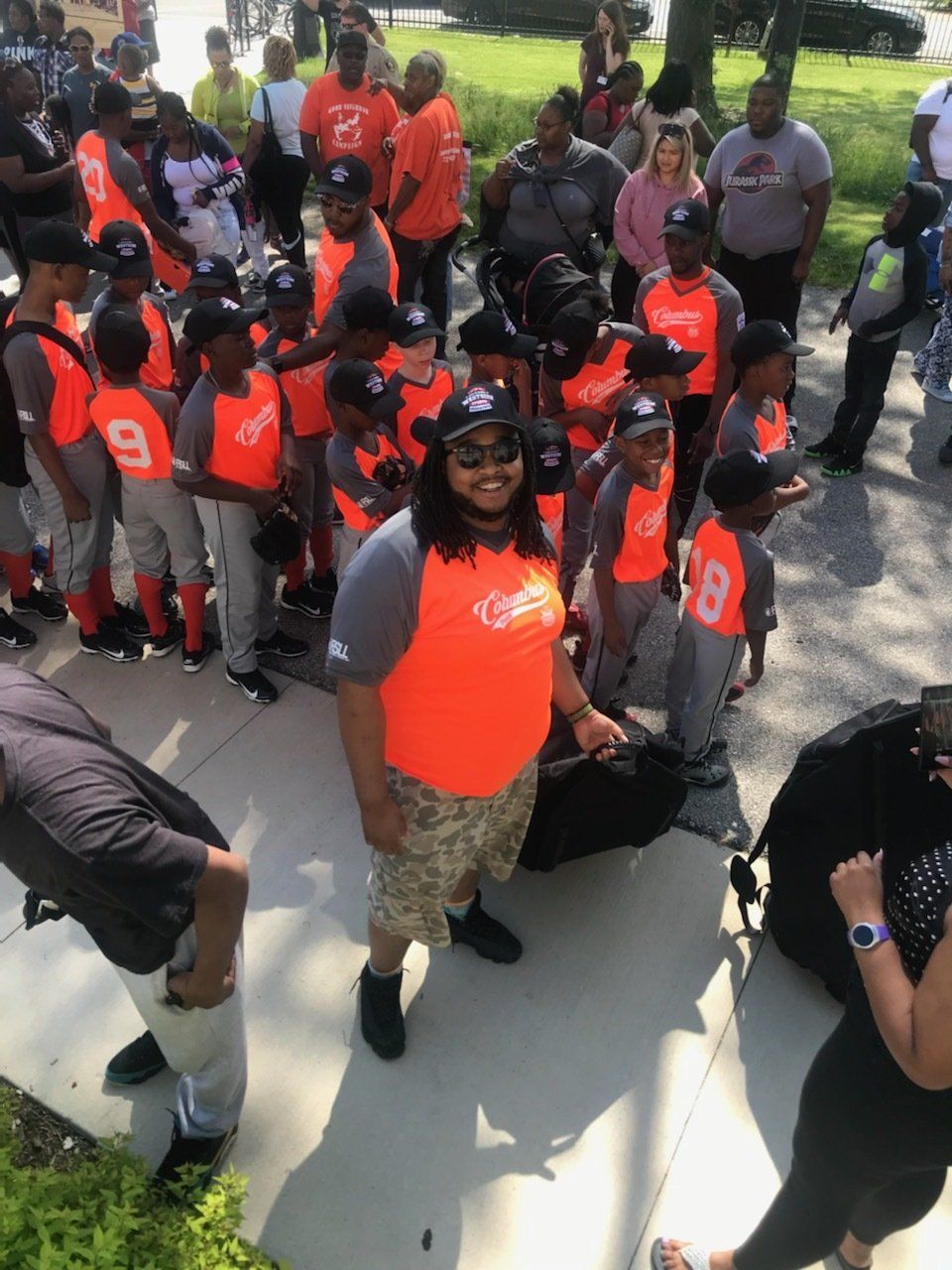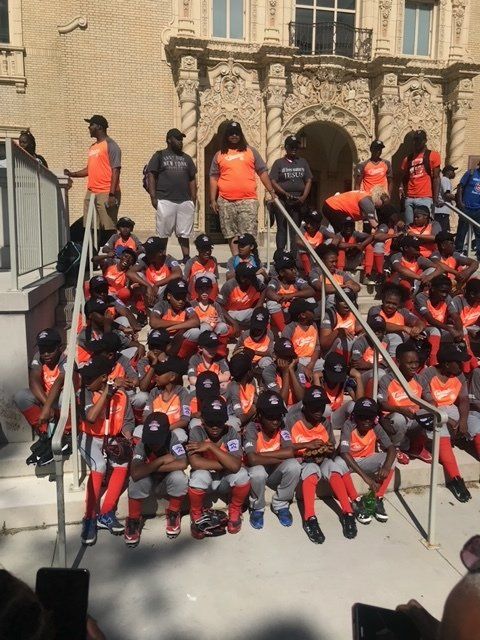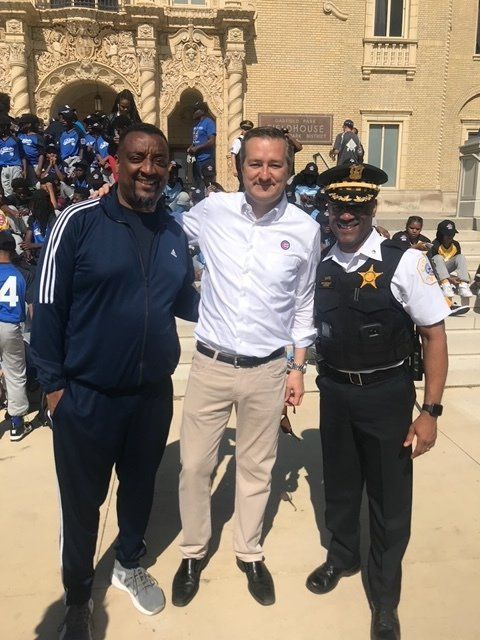NEWSLETTER
CHICAGO WESTSIDE SPORTS
SPRING 2021
NEWSLETTER
Sgt Jermaine Harris takes a selfie with members of the newly-formed Columbus Park team.
Sgt Jermaine Harris takes a selfie mid-parade with members of the newly-formed Chicago Westside Sports baseball league.
Birthday Sparks
Steve Epting pauses to flash a friendly smile as he leads a team of Columbus Park players in the inaugural baseball parade.
Major League Faithfulness
Sergeant Jermaine Harris, Pastor Steve Epting, and Stephanie Marquardt are the co-founders of the Chicago Westside Police and Youth Sports League. The trio crossed paths at what some might call a happenstance encounter, but they are quick to say there was nothing coincidental about it. If anything, their meeting was a series of divinely orchestrated appointments by God.
In the summer of 2016, Sergeant Jermaine Harris, a 10-year Little League coach, and Steve Epting, a local pastor, envisioned a baseball league for Chicago's westside youth. The neighborhood was surrounded by miles of parks, but there was only one where kids were playing baseball, which was about to be canceled. Their vision was to create an all-Westside league, where police would serve as volunteer coaches, local churches and organizations would get involved, and kids could play baseball in their own neighborhoods.
In the meantime, Stephanie and her husband Kurt were looking for a way to serve Chicago's Westside. As newcomers to the neighborhood through their church, they received a word of advice: "Until people get to know you, wait to be asked before jumping in." As they prayed and waited for an invitation to get involved, they attended the faith-based meetings for community leaders, represented by multiple communities, where they did a lot of listening and observing.
In April 2018, there was a community “block-club” (block clubs are a means for neighbors to get to know and help each other) convention in the Austin neighborhood. Most of the Westside organizations, nonprofits, and churches set up booths for the Austin residents to become familiar with the resources available to them. Stephanie attended the convention with her church, Chicago West Bible Church. While she was helping seniors sign into computers to register for services , Sergeant Harris stopped by to talk.
Later that summer, at a family funfair hosted by her church, Stephanie had a second opportunity to talk with Sergeant Harris about his vision for a youth baseball league.
Not sure what God might be orchestrating, Stephanie and Kurt thought that perhaps his business, Marquardt of Barrington, could provide the uniforms for Sergeant Harris' baseball league. Remembering the advice they'd received earlier, they continued to wait and pray for an invitation.
At the following month’s community faith-based meeting, they received their invitation. Would City of Refuge-Chicago help administer the small league out of Columbus Park? "Yes!" And just like that, it was time to roll up their sleeves and get to work!
"It just happened so naturally, and God put things exactly where they needed to be. We started to notice that in every neighborhood, there's a church, the police, and some nonprofits already at work," Sergeant Harris shared. Harris, Epting, and Marquardt quickly agreed that this would be their foundation. Soon, they began to refer to the church-police-nonprofit trio as the 'three-legged stool' that would serve as the base for their community collaboration.
Epting chuckles reminiscently as he shares a favorite memory from that first opening day, “There were 300–500 kids there, having uniforms for the first time in their lives, not knowing even how to put on their protective gear. We were all excited. This was the right thing at the right time.”
Birthday Sparks
Team members in the Garfield Park baseball fields are paid a visit and mentored by Allan Houston, a former New York Knicks player.
Fashion Magazine
An officer teaches a young archer the proper form for shooting an arrow.
Blurred Lines
Fans at an Austin basketball game cheer on their team from the sidelines.
Looking Ahead
Three years in, Chicago Westside Police and Youth Sports is off to a strong start and has no intention of slowing down. The goal is to build a legacy and, most importantly, build sustainability on Chicago's Westside. To do this, people from the community began assuming leadership roles.
"We desire to build into the people of our community, to develop local leaders. As we evolve, the goal is that a mom, or anyone for that matter, would be able to build a team," Harris explained.
There's a dream to build a conference in each part of the city that could culminate with an exciting end-of-the-season championship game at a big venue. The big goal is to bring all Chicago's neighborhoods together, and sports are a great way to make this happen.
The three hope that Chicago Westside Sports will become a pillar for the Westside’s youth; and a place where the kids, mentors, churches, businesses, and the police will continue to work together for a common goal. To continue, “We’ll have to think bigger than we are now,” forecasted Epting, “Westside Sports is one of the vehicles that will stick."
Join us!
Fueled by her faith, Marquardt acknowledges that without exception, Chicago Westside Sports’ needs have been, and continue to be, met supernaturally by a God who cares deeply about every detail. Determined to prove that God is as faithful today as in the days of the Old and New Testament, she looks to Him to meet all their needs. And she's never been disappointed.
"I'm constantly praying. I'm open to anything He has for me," Marquardt candidly shares. "He is so faithful. We've had everything we needed every single time. There's no explanation for how or why these things happened. I can't explain; it's just God."
Provision has come through stores, sports figures, organizations, and individuals who have all been incredibly generous, and not to mention timely with their generosity.
When asked how to get involved, Marquardt responded,
1. Volunteer. We need adult volunteers and coaches/mentors. If you'd like to learn more about how you could get involved, complete the volunteer form on Chicago Westside's website.
2. Cheer. Come out and cheer for our kids during a game!
3. Pray. Because of COVID-19, we've had to scale back on many of our opportunities. Please pray that we can get back to full capacity as soon as possible. Pray for us to fill the need for additional volunteers, sponsors, and funding. And please pray for the kids, the families, and the neighborhoods represented in our programs.
4. Advocate for us! Tell your friends and family about the lives being transformed on Chicago's Westside! Follow us on social media, then like and share our posts.
Rooting for the Home Team
Coach Brandon Wilkerson’s roots run deep in Chicago’s Westside. He grew up in the Austin neighborhood where his dad was a pastor. Now he’s raising his own son there.
Wilkerson is a quiet, laid-back guy. He’s a little uncomfortable talking about himself, but he quickly opens up when questioned about Chicago Westside Sports.
He’d been volunteering with Westside Health Authority’s Good Neighbor campaign when he came across a flyer for Chicago Westside Police and Youth Sports. As soon as he read that the program consisted of a collaboration of police, nonprofits, churches, and community members, he knew this was what his community needed, and he wanted in.
He’s got a lot to teach the kids—both about sports and life. Much of what goes on during practices is transferable to life outside the game. For example, as Brandon pointed out, “ In baseball, a batter has three strikes to hit the ball. You may or may not hit it, but there’s always another chance. Learning not to give up on yourself is as good a lesson for on or off the field.”
The league consists of police officers and community members who desire to leave a positive mark on the neighborhood’s youth. “The league is changing the way kids view the police. It’ll take some time, but that’s what sold me on this project—the police being here as coaches. It makes a loud, positive statement that the police are here to coach, not to patrol. They know the kids by name and vice versa. It’s a shift in the police/community relationship that’s going to make a big impact over time.”
According to Wilkerson, “the collaboration of everyone working together-the nonprofits, churches, and police,” is what makes Chicago Westside so successful. “It makes the community safer and keeps the youth busy. It gives the community a safe atmosphere, a family-vibe, and kids feel the community’s support. For many of the kids, this is the first time they have seen the community-guys and the police on the same page.”
Wilkerson views the team as a family with one goal: to get better every day. What’s his favorite thing about coaching the kids at Chicago Westside? He replied immediately, “Seeing a kid who thinks they can’t do something and then watching the fulfillment and joy of seeing them do it. Watching them develop and pushing them to it is the best thing about coaching.”
In closing, Wilkerson has one last thing to say: “We need more coaches! I encourage all my friends to get involved.” If you are interested in serving as a volunteer coach, fill out the volunteer form on Chicago Westside’s website.
The Meaning of Mentorship
Officer Nicole Velazquez grew up in an underprivileged neighborhood. Now a police officer, she serves a community much like the one where she was raised.
She remembers that kids and police didn't always get along during her youth, but the kids generally listened to and respected the authority. This is no longer the case, and she intends to establish what she calls "a new way to an old-school relationship with the police."
As Coach Nikki, she pours her heart and soul into her role, incorporating her Christian faith into her work. Although faith-filled messages and prayer might be new territory for some of the kids, she is confident it's an essential component for the successful transformation of these kids and their neighborhoods.
All Chicago Westside practices begin or end with roughly 30 minutes of mentoring through a practical 12-week mentoring curriculum written by Officer Velazquez using NBA great Allan Houston’s FISLL mentoring curriculum. (FISLL stands for Faith, Integrity, Sacrifice, Leadership and Legacy.) The curriculum mentors kids through relevant, real-life issues such as gun violence and conflict resolution.
At the site where Coach Nikki coached, there were over 160 youth regularly participating. Initially, the large group of kids were pretty rowdy during the mentoring sessions. They were eager to play basketball and couldn't see the value of these pre-practice sessions. With 160+ kids packed into the gym, it didn't take long before the younger kids imitated the older kids' negative behavior.
Modifications were made to the mentoring sessions, and with the addition of nearby gym space, and dividing the groups into age divisions, the mentoring sessions and practices became more fun and interactive. As the weeks went by, the kids began to engage in the discussions. The mentoring times became a place where the kids could purge some of the ugliness of their day. By the time the twelve weeks were up, the kids were comfortable hugging and crying in front of each other.
As the kids start to embrace the lessons taught in the mentoring sessions, Officer Velazquez and the rest of the volunteer team expect to see some significant positive changes in the neighborhood.
Stories of Impact
Tyrell
Sergeant Harris was surprised to walk into the principal’s office at a school in West Garfield and find
Tyrell*, a boy from one of the Chicago Westside basketball teams. Tyrell, a sixth-grader, was sitting at a desk, checking for registration signatures, compiling uniform sizes, making flyers, and recruiting new players.
Likening Tyrell to a young sports agent, Sergeant Harris reported being thrilled that this principal had empowered Tyrell with the opportunity to use his administrative talents.
Like the other kids in the program, Tyrell lives in an under-resourced neighborhood where gun violence and 911 calls are common. Yet here he sat, hard at work, maximizing his talents, making good on the opportunity given to him by a principal who believed in him.
“No matter what skills a child might have, whether they be athletic or otherwise, we think the sky’s the limit, and we are always excited to see the kids reaching for the stars.” –Sergeant Harris
Denzel
Denzel*
never seemed to fit in and was picked on because of his disabilities. Although they couldn't afford it, his mom planned for the family to move so Denzel could get a fresh start at a new school.
But then, Denzel played his first year of baseball on a Chicago Westside Sports team, and the tides began to turn. Here, he found a place of acceptance within the family atmosphere and a coach who didn't let anyone get away with teasing or bullying.
Denzel started having fun with his teammates, his mom began making new friends and soon was glad she'd changed her mind about moving. For Denzel and his mom, the experience was nothing short of amazing.
Jamar
Jamar* was a hot-head who seemed to attract trouble. When he started playing sports with Chicago Westside Sports, his mom noticed a big change in her son. Turned out that sports really calmed him down. Soon his attitude improved both at home and school. His mom is very grateful for the program and its positive influence on her son.
Ronald
Although
Ronald* was only 9-years old, that didn't stop him from angrily cursing at his coach. Instead of throwing him out of the program, as might have happened in another league, Ronald’s coach, Brandon Wilkerson, worked to understand him.
It took some effort to teach Ronald accountability and for the boy to accept the coach's rules. But it was time well invested. Today, Ronald acts as a team captain and is a positive leader on the team.
*Names have been changed to protect the children’s privacy.
coach
Pastor Epting has fond memories of coaching his daughter’s softball team. You can hear the smile in his voice as he shares, “It was the best of times, and the worst of times.” But coaching your kids’ teams is a rare opportunity for fathers in the Westside neighborhoods, that is, before Chicago Westside Sports came to town.
Epting shared about a gentleman who was given the opportunity to coach his daughter’s team. “When fathers coach the teams their children play on, they aren’t just coaching; they are mentoring because they have a vested interest in the players,” Epting stated. Chicago Westside Sports doesn’t just provide an opportunity for kids to participate in athletics; it also provides a medium for the adults in the community to invest and build into the community’s youth.
"I WANT TO GET INVOLVED"
SELECT THE AREA BELOW THAT BEST DESCRIBES WHICH VOLUNTEER OPPORTUNITIES YOU'D LIKE TO LEARN MORE ABOUT:

